- Maruti Suzuki India
- Narendra Modi
- e Vitara
- TDS Lithium-Ion Battery Gujarat
- Suzuki Motor Corporation
- Toshihiro Suzuki
PM Modi Flags Off Maruti Suzuki’s First Made-in-India EV, e Vitara
- By MT Bureau
- August 26, 2025
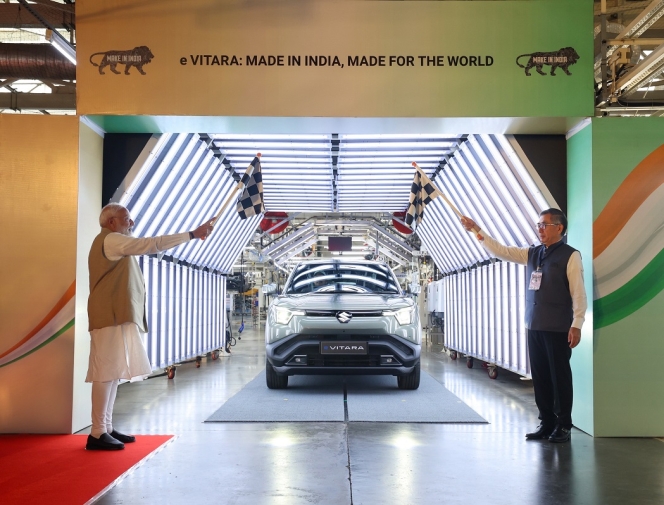
The Prime Minister of India Narendra Modi commemorated the start of production of Maruti Suzuki India’s first battery electric vehicle (BEV), the e Vitara, at Suzuki Motor Gujarat.
The model is being manufactured for both domestic sales and exports to over 100 countries, including markets in Europe and Japan. Maruti Suzuki India aims to produce 67,000 electric vehicles during FY2026.
At the same event, PM Modi also marked the start of local manufacturing of lithium-ion battery cells and electrodes for strong hybrid vehicles at TDS Lithium-Ion Battery Gujarat, a fellow subsidiary of Maruti Suzuki India. This makes TDSG the first company in India to achieve electrode-level localisation of lithium-ion battery cells, used in hybrid systems of models such as the Grand Vitara.
Maruti Suzuki said the e Vitara, built on a dedicated EV platform, will be India’s largest mass-produced and exported electric vehicle. The first export batch will be shipped via Pipavav port to European countries including the UK, Germany, France, Italy and the Nordics.
Toshihiro Suzuki, Representative Director and President, Suzuki Motor Corporation, said, “We are deeply honoured that Hon’ble Prime Minister graced the occasion of commemoration of two historic events for the Indian automobile industry. His inspiration and visionary leadership have made this possible. His vision of Make in India and Aatmanirbhar Bharat have been inspiring Suzuki to invest in India. These milestones are also a testimony to the enduring Indo-Japanese partnership, built on mutual trust and a shared vision for progress and a carbon neutral future. We will provide all products and technologies that will reduce oil consumption and imports and carbon emissions like battery electric vehicles, strong hybrid electric vehicles and vehicles powered by natural gas and biofuels.”
Suzuki has further announced that the automaker will invest over INR 700 billion in India over the next five to six years.
- Automotive Component Manufacturers Association
- ACMA
- Boston Consulting Group
- BCG
- Vinnie Mehta
- Vikrampati Singhania
- Vikram Janakiraman
ACMA And BCG Release Study On Smart Factory Adoption In India
- By MT Bureau
- February 11, 2026
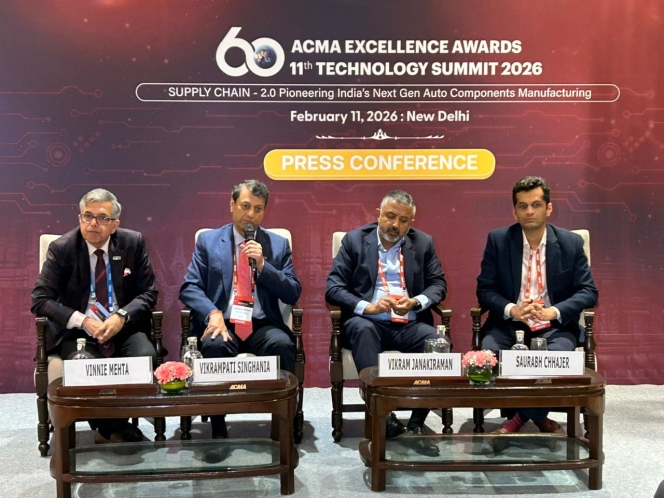
The Automotive Component Manufacturers Association of India (ACMA) and Boston Consulting Group (BCG) have released a joint study titled ‘Bolts, Bytes and Bots: Reimagining Next-Gen Auto Component Manufacturing in India’. The report examines the impact of digitalisation, automation and analytics on the sector.
The Indian auto component industry grew at a CAGR of 14 percent between FY2020 and FY2025, reaching a value of USD 80 billion. During this period, exports increased 1.5 times to approximately USD 23 billion. The sector is now targeting USD 100 billion in exports by FY2030.
The study indicates that over two-thirds of surveyed companies are in the pilot, scale-up, or fully integrated stages of implementing smart factory initiatives. Nearly 60 percent of these firms report benefits in productivity, quality, asset utilisation and issue resolution.
- Shift from basic connectivity to advanced analytics and AI-based maintenance.
- Use of digital twins and automated systems to manage volume and complexity.
- Focus on operations and quality as primary areas for digital intervention.
- Move towards interconnected digital stacks rather than isolated solutions.
Digital readiness is becoming a requirement for global OEM sourcing. International partners increasingly expect high standards in traceability, audit readiness and quality control. The report finds that companies with scaled deployments are twice as likely to experience a significant business impact compared to those in the pilot phase.
Vikrampati Singhania, President, ACMA, said, “The findings clearly indicate that Smart Factory initiatives are moving from experimentation to execution across the sector. The next phase must focus on scaling these efforts across plants and the supplier ecosystem. This will require shared platforms, deeper partnerships and coordinated ecosystem development, where industry bodies like ACMA can play a catalytic role.”
Vinnie Mehta, Director General, ACMA, added, “What stands out is the structural shift in how digitalisation is being viewed no longer as a discretionary investment, but as a long-term lever for competitiveness. As the industry balances export growth, coexistence of multiple-powertrains and workforce challenges, smart manufacturing offers a practical pathway to improve reliability, productivity and quality using existing assets.”
Vikram Janakiraman, Managing Director and Senior Partner, BCG, noted, “India’s auto component sector has led the charge on localisation and import substitution over many years, building deep manufacturing capability and scale. Today, as growth accelerates across domestic and export markets, the challenge is managing both volume and complexity. It is promising to see that the sector has made a start by adopting Smart Factory initiatives, with Indian companies already realising significant OEE improvements, quality gains, and better throughput from existing assets.”
- Tata Motors Passenger Vehicles
- Tata Motors
- Stellantis
- Fiat India Automobiles
- Shailesh Chandra
- Gregoire Olivier
Stellantis And Tata Motors Ink MoU To Explore Further Collaboration
- By MT Bureau
- February 10, 2026
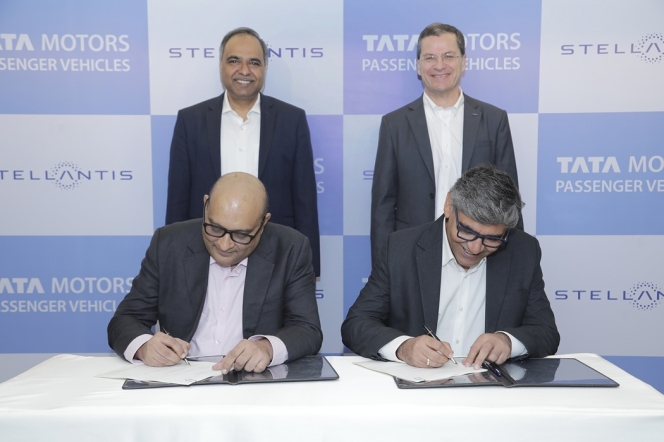
European auto major Stellantis and Tata Motors Passenger Vehicles (TMPV) have marked the 20th anniversary of their 50:50 joint venture, Fiat India Automobiles (FIAPL) and signed a Memorandum of Understanding (MoU) to explore further opportunities in manufacturing, engineering and supply chain operations within India and international markets.
Since its inception, the partnership has produced more than 1.37 million vehicles. The joint venture currently employs approximately 5,000 people and maintains a production capacity of 222,000 vehicles per year.
The FIAPL plant currently manufactures four Jeep models for Stellantis and three passenger vehicle models for Tata Motors. The facility has established operations across vehicle assembly, powertrain production and supply chain management.
Gregoire Olivier, Chief Operating Officer, Stellantis Asia Pacific, said, “FIAPL stands as a testament to what two strong organisations can achieve together. As we commemorate this milestone, we remain focused on evolving the partnership to support future-ready manufacturing, innovation and sustainable growth in the region.”
Shailesh Chandra, Managing Director & CEO, Tata Motors Passenger Vehicles, added, “Our partnership with Stellantis through FIAPL reflects the strength of a long-standing collaboration built on trust, shared values and a common vision. We look forward to deepening this relationship with Stellantis in the years ahead.”
- Tata Motors Passenger Vehicles
- TMPV
- Jaguar Land Rover
- JLR
- Range Rover Evoque
- M K Stalin
- N Chandrasekaran
Tata Motors And Jaguar Land Rover Commence Operations At New Tamil Nadu Facility
- By MT Bureau
- February 09, 2026
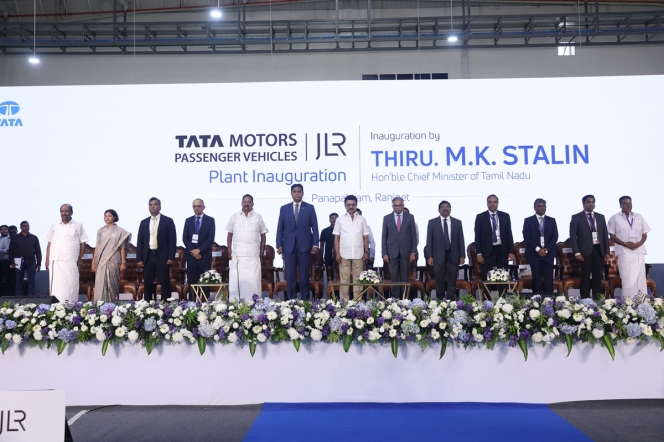
Tata Motors Passenger Vehicles (TMPV) and its subsidiary Jaguar Land Rover (JLR) have begun operations at a new manufacturing facility in Panapakkam, Ranipet district. The plant is a greenfield development designed to produce internal combustion engine (ICE) vehicles and electric vehicles (EVs) for both brands.
The first vehicle produced at the site is the locally manufactured Range Rover Evoque. The project represents an investment of INR 90 billion and is expected to create 5,000 direct jobs.
The facility covers 470 acres and marks the first phase of a larger manufacturing hub. It is designed to reach an annual production capacity of 250,000 vehicles over the next five to seven years. The site is intended to serve both domestic and international markets, utilising its proximity to Tamil Nadu's ports for exports.
Key Plant Features:
- Sustainability: Guided by carbon-neutral principles, the plant intends to operate on 100 percent renewable energy.
- Manufacturing Scope: Includes assembly for next-generation passenger cars and luxury SUVs.
- Workforce: Focuses on local recruitment and aims for a high share of women employees across levels.
The opening of the Panapakkam plant signals a shift for JLR's Indian operations. The company intends to migrate Completely Knocked Down (CKD) assembly for several models from its Pune facility to this new hub in southern India. This move is designed to enhance operational efficiency and capture increasing demand in the luxury vehicle segment.
M K Stalin, Chief Minister of Tamil Nadu, said, “Tata Group has long played a pivotal role in nation building and shares a deep, historic partnership with Tamil Nadu. With the commencement of operations at this new manufacturing facility and the rollout of the first Range Rover Evoque in Panapakkam, Ranipet, the state is proud to witness the expansion of world-class automotive manufacturing. Tamil Nadu welcomes this significant milestone and remains committed to supporting industries that create jobs, drive innovation, and reinforce our position as India’s leading hub for manufacturing and mobility.”
N Chandrasekaran, Chairman, Tata Sons and TMPV, added, “The inauguration of our Panapakkam facility marks a significant milestone in the Tata Group’s journey to accelerate India’s leadership in sustainable and future-ready manufacturing. We are also proud to deepen our long-standing partnership with Tamil Nadu, a state that continues to drive industrial excellence, innovation, and inclusive growth. With this facility, we look forward to producing vehicles of exceptional quality, craftsmanship, and technology for customers in India and around the world.”
- Skoda Auto Volkswagen India
- SAVWIPL
- Kylaq
- H D Kumaraswamy
- Union Cabinet Minister of Heavy Industries and Minister of Steel
- Piyush Arora
Skoda Auto Volkswagen India Crosses 50,000-Unit Production Milestone For Kylaq SUV
- By MT Bureau
- January 27, 2026
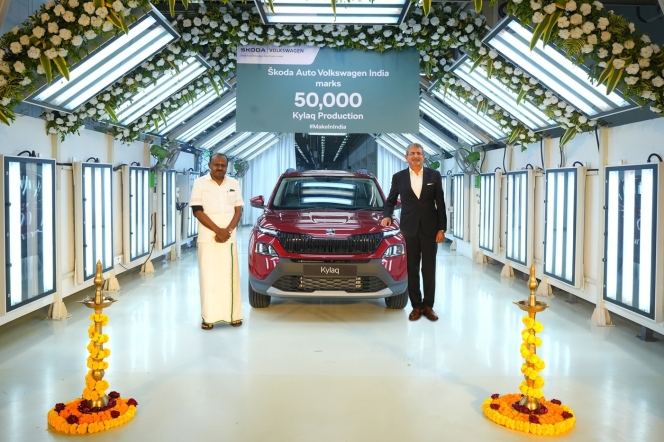
Skoda Auto Volkswagen India (SAVWIPL) has achieved a new production milestone of rolling out 50,000 units of the Skoda Kylaq from its Chakan facility.
The Kylaq, the company stated, has contributed 36 percent to the Group’s YoY growth in 2025. It achieved this volume by expanding its operations and increasing the use of domestic components.
To support the production of the Kylaq, SAVWIPL increased the capacity of the Chakan plant by 30 percent. The vehicle is built on the MQB-A0-IN platform, a chassis architecture designed for the Indian market. The group has focused on localisation and the development of a local supplier network to support its manufacturing output.
The milestone follows 25 years of the group's presence in India, during which it has developed an integrated ecosystem and a local talent pool. By increasing production and localisation, the company aims to support the government’s manufacturing initiatives while deepening its engineering and sourcing capabilities within the country.
H D Kumaraswamy, Union Cabinet Minister of Heavy Industries and Minister of Steel, said, “I congratulate Skoda Auto Volkswagen India on achieving this production milestone and for their continued commitment to the ‘Made in India’ initiative.”
Piyush Arora, MD & CEO, Skoda Auto Volkswagen India, said, “The 50,000‑unit milestone for the Kylaq reflects the deep trust and affection our customers have shown for this product. Built on the proven MQB‑A0‑IN platform, the Kylaq’s success is a powerful validation that vehicles designed in India, both for India and the world, continue to earn admiration and confidence from customers domestically and globally.”






Comments (0)
ADD COMMENT